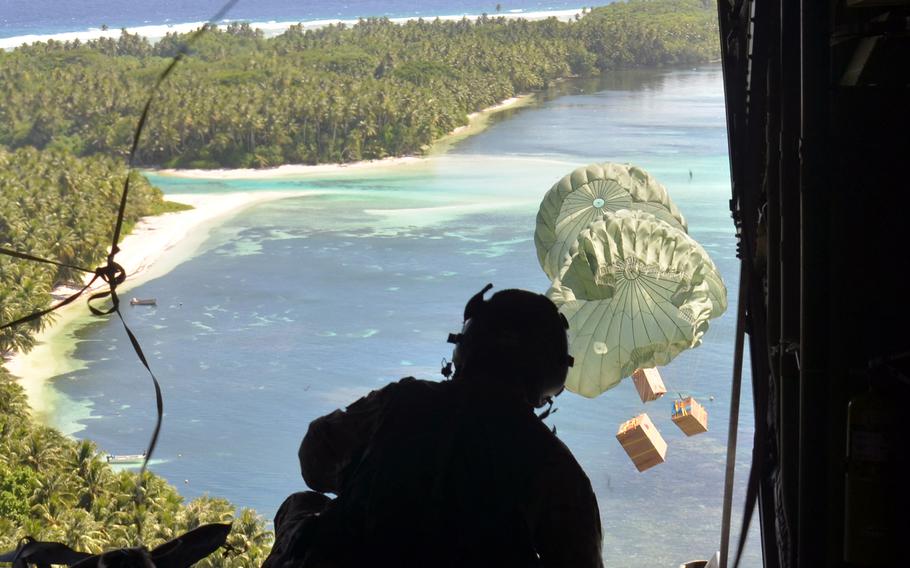
Staff Sgt. William Jenkins, a loadmaster with the 36th Expeditionary Airlift Squadron at Yokota Air Base, Japan, watches an Operation Christmas Drop bundles fall to Falalop, an island in the Federated States of Micronesia, Tuesday, Dec. 5, 2023. (Seth Robson/Stars and Stripes)
ANDERSEN AIR FORCE BASE, Guam — Parachutes floated colorful crates brimming with provisions to a pair of inaccessible Oceania islands Tuesday, part of the Defense Department’s longest running humanitarian-aid mission.
Six bundles at Andersen that morning were loaded onto a C-130J Super Hercules from the 36th Expeditionary Airlift Squadron at Yokota Air Base, Japan. The plane then flew 400 miles southwest to Yap, a cluster of small islands in the Federated States of Micronesia.
Each Operation Christmas Drop bundle — filled and decorated last week by service members and other volunteers — contains essentials like food, water, medical supplies, fishing gear, clothing and toys.
Now in its 72nd year, the tradition began during the Christmas season of 1952, when the crew of a B-29 Superfortress saw islanders waving at them from Kapingamarangi, Micronesia, according to a writeup on Andersen’s website.
“In the spirit of Christmas the aircrew dropped a bundle of supplies attached to a parachute to the islanders below, giving the operation its name,” the writeup said. “Today, airdrop operations include more than 50 islands throughout the Pacific.”
This year’s mission, which runs until Dec. 13 and includes sorties to the Republic of Palau, will drop enough provisions for 20,000 islanders, the Air Force said. U.S. airlifters are flying alongside C-130Js from Canada and C-130Hs from Japan and South Korea.
“Flying at low levels — 1,000 to 500 feet above the islands — is special,” Super Herc pilot Capt. Ian Sweeney said after Tuesday’s mission.
He wore a Santa hat as his plane descended to 300 feet. Loadmasters then kicked the bundles, two at a time, off the ramp and watched them float toward lush green land or brilliant blue shallow waters.
The first two sets dropped on Falalop, a 2 ½ acre island home to between 500 and 600 people. Two bundles floated down to a beach and two landed on an old airstrip.
The last bundles dropped just off the coast of nearby Tagaulop.
“This was my first time delivering a bundle of humanitarian aid to these villagers,” Sweeney said.
The aircraft’s crew were in radio contact with the islanders during the mission, he added.
“The gratefulness they expressed is something we rarely experience,” Sweeney said, noting that airlifters don’t often get to speak with those who receive their drops.
A day earlier at Andersen, a group of dignitaries — President of the Federated States of Micronesia Wesley Simina; U.S. Ambassador to Micronesia Jennifer Johnson; U.S. Forces Japan/Fifth Air Force commander Lt. Gen. Ricky Rupp; and longtime Christmas Drop volunteer Bruce Best — kicked off the mission by pushing a bundle onto one of three Yokota-based Super Hercs.
Christmas Drop is a demonstration of friendship between the United States and Micronesia, Simina told those gathered for the push ceremony.
“It’s a testament to the intense cooperation between our nations,” he said.
Maj. Gen. John Klein, commander of the Air Force Expeditionary Center at Joint Base McGuire-Dix in Lakehurst, N.J., praised Andersen’s 734th Air Mobility Squadron for planning and coordinating the operation.
“What this allows us to do is practice dynamic delivery airdrop to uncontrolled and non-surveyed drop zones,” he told Stars and Stripes after the push ceremony. “That’s a critical capability that Pacific Air Forces need in this theater.”
Missions like those carried out during Operation Christmas Drop could be required in a natural disaster or a crisis, Klein said.
“From a logistics perspective, you are dealing with the tyranny of distance,” he said, adding that airlift is the only way to rapidly supply forces in the region.